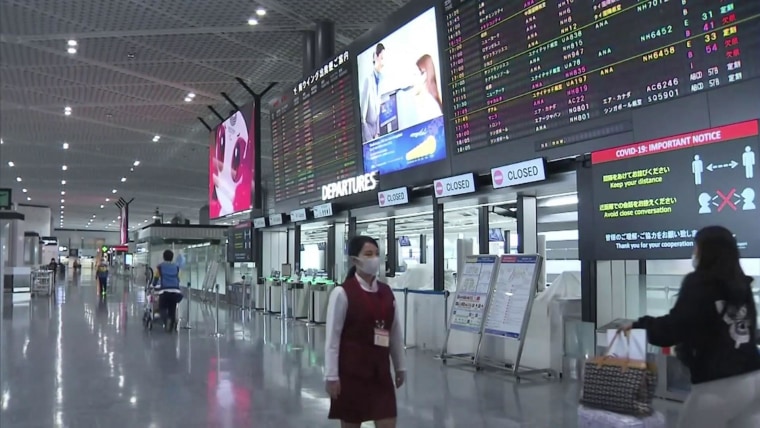TOKYO — Japan's vaccination roll-out faces logistical hurdles that could further delay the slow-moving campaign, experts and officials say, complicating plans to deliver wide-scale coronavirus inoculations in time for the Olympics.
Already the last major industrial country to start vaccinations, Japan is likely to be hampered on the ground by a lack of containers and dry ice, and difficulties in recruiting medical staff, more than a dozen people involved in the inoculation drive told Reuters.
Prime Minister Yoshihide Suga has said vaccines are critical to holding a successful Olympics after last year's delay. The first shots for medical workers are planned at the end of February, leaving just 145 days until the start of the Games on July 23.
Download the NBC News app for breaking news and politics
Japan will need to deliver about 870,000 injections a day to inoculate half its population by then, with each person needing two shots.
"The government's plan puts a big burden on the individual municipalities in giving out the vaccines," said Koji Wada, an adviser on the government's Covid-19 response. "Big metropolitan areas like Tokyo may have the infrastructure to roll out the vaccinations smoothly, but more rural areas... could have more difficulty."
Companies that transport medicines say there may not be enough specialized containers to carry the Pfizer Inc vaccine, which has to be stored at minus 75 degrees Celsius. Initially at least, the Pfizer vaccine is the only one to be used in Japan.
A government source told Reuters that officials only began assessing whether there were enough containers or dry ice to pack them late last year.
Japan's vaccination tsar, Taro Kono, outlined the scale of the challenge last week. The coordination of medical workers, transport, freezer production, needle disposal and dealing with local governments are handled by different ministries, he said on Twitter.
Medical staff, already exhausted from caring for a third, deadly wave of infections, will need to be mobilized to give out shots of the still unapproved vaccine.
Ahead of those first jabs, Japan's health ministry on Wednesday carried out mock inoculations in a nursing school gym in Kawasaki, in Kanagawa prefecture.
There, nurses led yellow-vest clad volunteers into booths for mock injections and then left them in a waiting area for 30 minutes to check for allergic reactions.
With five nurses, the facility could deal with around 30 patients per hour and would open and close depending on vaccine supplies, according to officials.
“I hope this drill can serve as an example that can be used or adapted elsewhere around the country,” Kawasaki mayor Norihiko Fukuda told reporters.
Opposition Democratic Party for the People leader Yuichiro Tamaki, who has pressed Kono and Suga for a vaccine schedule, predicted that only a fifth of Japan's population may be vaccinated in time for the Olympics.
"You need at least 60 percent to get herd immunity, so we could face a fourth or fifth wave of infections," he told Reuters.
Japan has purchased enough Pfizer vaccines for 72 million people, more than half its population. The government is buying some 20,000 special coolers and sourcing massive quantities of dry ice for its transportation.
Japan produces about 350,000 tonnes of dry ice per year, but it's mostly for food preservation, according to an official with one of the major makers. To transport the vaccine, the government will need a granular or powder type of ice, which can keep temperatures colder than the standard dry-ice blocks used for food.
"It's not just a case of being able to switch a part on a machine, the production method (for the ice) is different," said the official, who asked not to be identified. "It would take several months to retool."
Transport company Nippon Express Co Ltd was involved in discussions to distribute Pfizer's vaccine, but was depending on the drugmaker to provide special containers, a spokesman said.
By February the company will have completed four specialized drug warehouses across Japan, but those aren't designed to store for ultra cold products like the Pfizer's vaccine, he said.
Nihon Freezer Co, which makes industrial refrigerators, is building 2,300 freezers for the government, but without a formal contract until the vaccine is approved, a company official said.
"We have made about half of them and should have the remainder finished by June," the official said about the freezers it manufactures in Denmark. "Finding enough components has been difficult because of the sudden increase in production."
The Link LonkJanuary 27, 2021 at 06:25PM
https://www.nbcnews.com/news/world/olympic-hurdles-japan-s-vaccine-roll-out-dry-ice-containers-n1255806
Olympic hurdles for Japan's vaccine roll-out: Dry ice, containers and overworked doctors - NBC News
https://news.google.com/search?q=dry&hl=en-US&gl=US&ceid=US:en


No comments:
Post a Comment